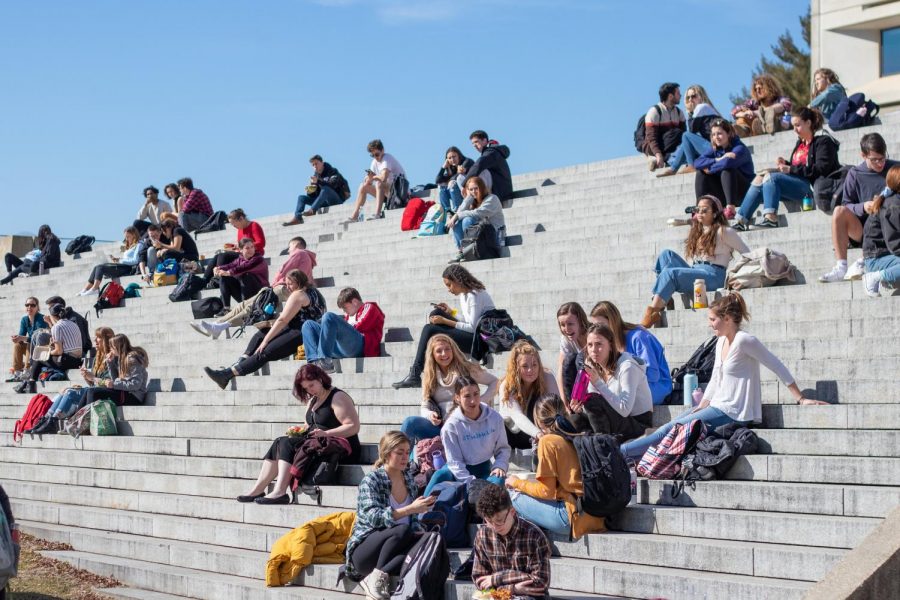After initial plans to allow approximately 7,000 students to live on campus, the University of Massachusetts reversed its plan for the fall semester Thursday night and will instead accept a significantly reduced number of on-campus students.
The move comes 18 days before the semester starts, with many students planning on moving in much earlier than the Aug. 24 class start date. The news was released in a letter from the chancellor, in which he cited the worsening COVID-19 public health crisis in Massachusetts as influencing his decision.
“Quite simply, when we make a clear-eyed assessment of the public health data and comparable reopening attempts that are playing out across the country, we feel that we have no choice but to make the difficult decision to enact these changes to our fall plan,” Chancellor Kumble Subbaswamy said in his email.
Students were left with a number of questions, many of whom had already bought dorm decorations and supplies and had prepared transportation to the campus in the next few weeks. Since they had been preparing for on-campus housing in the fall, many students are scrambling to rethink their fall housing and dining options.
“I bought everything for my dorm, put in an order for a microwave and mini fridge, reserved a parking spot, and I even picked a move in date and time two days before the reversed decision. I chose not to stay home because being a freshman or ‘first-year’ student, I chose experience over money,” said incoming freshman Jenna Sweeney, a sports management major. “I was planning on making friends in my building or outdoors trying to have a semi-normal college experience like I should. The late decision to keep students home affected me tremendously and now I will be staying at my house, taking classes over Zoom in my bedroom with my family working remotely downstairs.”
“Before the announcement was made today, I was packing my last bit of items as I planned to return to campus on Monday,” said Ajeya Clouden, a senior sociology and political science major. “I had the position as a [Resident Assistant] and a training mentor for this upcoming semester. I’m now unsure of my housing situation as I need to find an apartment in the next two weeks. This is super stressful for me especially while holding a full-time internship and two jobs.
“I am unsure of what my plans will be. I feel like this was a slap in the face to students. Especially those who relied on coming back to campus for a variety of reasons.”
One of the first concerns raised when the reversal of the reopening plan was announced was whether or not Resident Assistants and Peer Mentors would be able to keep their jobs and the housing that is guaranteed with their employment. While the RA/PM Union and the University are still negotiating, initial reports from the RA/PM Union said that the University intended to keep 50 RAs and fire the remaining employees.
“My initial reaction was very mixed. On one hand, I think it was super important that the dorms are not filled to the capacity they were planning. It was bound to be a giant COVID hotspot, so I am glad they came to that realization,” said junior communication major Zoe Kaplan. “On the other hand, because this decision came so late, UMass is putting their most vulnerable students at risk, in ways that do not even include COVID. I have many friends who are RAs/PMs who rely on their paychecks and housing to go to school. Now that they are firing all but 50 of them without any type of severance, it is showing the true colors of the administration.”
The chancellor said in his message that the University recognizes that there are “some students who are dependent on campus housing and dining,” and said that such cases will be handled on a case-by-case basis, and “in most instances will be accommodated.”
Some students have not found this reassuring, as the short notice of reversal leaves them with little time to find housing and stretched means to do so. When asked what her biggest concerns are now, Miasyn Ray, a senior sociology major, said finances.
“Finances is probably the biggest thing,” Ray said. “Now that I must sign a lease, I need to put a lot of money upfront for rent and a security deposit.”
“Housing will be my main focus right now. However, mentally preparing myself for remote learning again is an adjustment,” Clouden said.
After receiving news of this change in such short notice, many students are questioning the University’s decisions and are expressing anger over what they perceive as a lack of communication and regard for their circumstances.
“I felt a mix of emotions, after having worked with admin so often I’ve unfortunately come to expect decisions like this being made by them, but at the same time I was really disturbed by how last minute they made this decision and the way they are treating RAs and other student staff,” said Sonya Epstein, a junior social thought and political economy major. “This just proved to me once again that admin are extremely disconnected from students, their policies consistently display a lack of empathy for what students are going through and how these decisions impact students’ livelihoods.”
“I am shocked that this is even allowed. I can’t believe they think it’s okay to have us go the entire summer without a shred of information,” Ray said. “I don’t think it’s okay, and completely irresponsible. I also thought about people who didn’t plan for this and rely on campus resources. My heart goes out to them, and I hope they can find resources to help them thrive. I want them to take accountability. Additionally, I want to see them actually show that they care about the students. I feel as though they only care about money at this point.”
Students also expressed concerns over continued communication, a feeling of uncertainty that stretches into the spring semester and their confidence in the University to relay clear information again at the end of the fall.
“I now know I’m going to have to have multiple backup plans as I figure out what to do for spring semester,” Epstein said. “UMass admin have proved we can’t rely on the decisions they make to stay the same and to be what is best for students so I’m making sure I have multiple options around what I’m planning to do for the spring. I’m also now going to be checking in on my friends a lot more because too many of us are now at a higher risk of housing, food and economic insecurity, which is absolutely horrifying.”
The question of students’ ability to continue performing academically in home and remote environments is a concern for many students, who either don’t feel they can continue course work at home or see virtual learning as a challenge to their education, and as a result, their scholarships.
“I was planning on living on campus. This significantly affects me, and I will now be looking for an off-campus accommodation,” Ray said. “I think it may also affect my academic performance because if I can’t find an adequate space to get my work done, then that will reflect in my work.”
“I’d like to go to grad school, and in order to do that I need to maintain a certain GPA for the specific scholarship I need,” said one student, a computer science and political science double major, who asked to remain anonymous. “Last spring was fairly disastrous in terms of learning for me — I would say that 70 percent of all the material I learned throughout the semester was presented before the campus closure. I was very worried about being able to focus, as my childhood home is fairly small, and my family is loud and disruptive. Being able to have my own space likely would have helped me focus on my classes, but unfortunately it seems that I’ll have to make do with what I have for a few more months.”
Moving forward, some students have persisting questions about their housing, refunds and employment. Following these changes, some students are rethinking what the fall semester will look like for them and have expressed that they feel like the University has provided them with information to help them navigate these changes and adjust.
“I would like to see more communication from the University. There are so many questions that still need to be answered. Will we get a housing refund? How will they compensate RAs who rely on the housing stipend for school? How will we utilize on campus resources that were going to be available? How will RSOs function? Etc.,” Clouden said. “Sometimes I feel left in the dark when the University makes huge decisions like this and doesn’t include much information about following steps.”
Some students are now considering taking the semester off and shared that aspects of the initial plan were a large part of their initial decision not to do so. Now, two weeks away from the start of the semester, students expressed feeling stuck with few options.
“I know many students I have talked to this summer, between my friends and working NSO, said they would not want to come back to school this semester if they are not able to be in Amherst. Now, just two weeks out, it feels as though they are trapping students who otherwise would’ve taken the semester off in order to keep their tuition money,” Kaplan said. “Looking towards the fall, I don’t completely know what my plans are yet. I am definitely staying in Amherst because I have a lease. I will most likely be a student this semester, but I am not 100 percent sure. It definitely does not feel worth paying full tuition for this. The biggest factor that I have to consider in whether or not I will take the semester off is if I will lose my scholarship in the process. It’s the reason I chose UMass and I truly cannot afford to go here without it, especially as an out-of-state student.”
For students spoken to who have been facing challenges at home, the reversal is weighing heavily on their minds as they look toward remaining in a difficult living situation for much longer than they had anticipated. One student, who would prefer to remain anonymous, described navigating food insecurity and a difficult environment while at home, and his concerns as he prepares to remain in that situation now until December.
“For me, the decision to come back to Amherst was based on my declining mental health in my childhood home since March, food insecurity and worries about being able to do online classes effectively,” he said. “For a lot of complex reasons that I won’t list, I unfortunately suffer from food insecurity when I am in my childhood home. I am blessed to be able to afford a UMass Dining meal plan whenever I am on campus, and I have to tell you, it is probably one of my favorite parts of attending UMass — enough so that I was very much looking forward to moving back this fall, into an unrecognizable environment, for the express purpose of having access to consistent and healthy food. By comparison, my diet at home is erratic and unhealthy — I’m now facing five more months of that and am scrambling to find solutions that could work better for me.”
“The worst part of all this is that I would like to apply for the ‘safety net’ housing that UMass is providing in the fall, but because my family has also received the news from Chancellor Subbaswamy and knows that I have no in-person classes, I can’t think of a way that I could apply for the failsafe housing,” he explained.
Claire Healy can be reached at [email protected] and followed on Twitter @clurhealy.



















